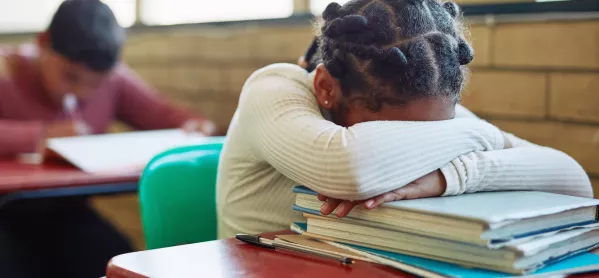Most secondary teachers say primaries ‘excessively drill’ pupils

More than three-fifths of secondary teachers feel primary schools “excessively drill” pupils for key stage 2 Sats.
Data collected by Teacher Tapp shows 61 per cent of secondary teachers surveyed think KS2 Sats results are not an “accurate reflection” of the academic standards of pupils because many primaries over-prepare them for the tests.
The survey was conducted last week, as the first Sats in three years were taken by Year 6 pupils across the country.
Of the 3,716 secondary school teachers who responded to the multiple-choice survey, just 11 per cent felt Sats were “a good reflection of pupil academic standards”.
The biggest proportion (61 per cent) said they did not feel Sats were an accurate reflection due to “many primary schools excessively drilling pupils” for the tests.
Responding to the results, Simon Kidwell, principal at Hartford Manor, said: “I think it’s about the accountability measures that we have, and it can lead to excessive drilling.
“So I think we do need to acknowledge what our secondary colleagues say and take a good look at the accountability measures that drive these sorts of practices.”
However, a primary head from London, who wished to remain anonymous, said, while primary schools in previous years could have been “excessively drilling”, this was not the case more recently.
- STA: Heads blast ‘ridiculous’ waits for help during Sats
- Feature: Why it’s time to rethink Sats
- Sats 2022: Commission to probe ‘neglected’ primary assessment
This did not mean drilling never took place, they said, adding that some heads “would feel the pressure - and that pressure is coming from above”.
They also highlighted that this was the first time primary schools have had the opportunity to “use live data for two years and some schools don’t want to be left behind”.
A third (31 per cent) of respondents said they did not feel Sats were an accurate reflection of academic standards because they “suspect a few pupils receive inappropriately excessive support during the tests”.
And a quarter (25 per cent) felt some primary schools give “excessive support to all their pupils during the administration of the tests”.
Specifically, nearly a third (32 per cent) said some primary schools “appear to be giving excessive support to achieve standards in key stage 2 writing”.
And almost half (48 per cent) said the tests were not an accurate reflection of standards, as they only measure a “very narrow range of academic capabilities”.
With more than one in five (22 per cent) saying they tend to find pupil data is “poorly aligned with their knowledge and capabilities” but they “don’t know why”.
More than half of teachers feel Sats are inaccurate
In a separate question, more than half of the 2,052 primary teachers surveyed felt KS2 Sats were not an accurate measure of pupil attainment.
More than one in 10 (11 per cent) felt the tests were “very inaccurate” as a measure of pupil attainment, while 41 per cent felt they were “not particularly accurate”.
Just over two in five (41 per cent) teachers said they felt the Year 6 Sats were an accurate measure of pupil attainment. Of this figure, just 1 per cent felt the tests were “very accurate” with 40 per cent saying the tests were “moderately accurate”.
4 per cent of respondents said they did not know how reliable they were, and 4 per cent said they could not answer.
Parents should be able to remove pupils from Sats exams
Teachers at both primary and secondary schools were asked about the rights of parents to remove their child from Sats.
A separate survey of 6,147 teachers at primary and secondary phases found that more than a third (39 per cent) of teachers felt parents should have the right to remove their child from the primary Sats exams.
17 per cent strongly agreed with the move, while 22 per cent agreed.
More than one in five (21 per cent) neither agreed or disagreed with the statement, while 26 per cent strongly disagreed.
English teachers think Sats is less accurate
The opinions of secondary teachers on the ability of Sats to measure academic standards varied depending on the subject they taught.
English teachers seemed to be less confident in the accuracy of the Sats, with just over one in 20 (6 per cent) saying the tests were a “good reflection of pupil academic standards reached”.
In contrast, over one in 10 (12 per cent) of maths teachers at secondary thought the tests were accurate.
And over one third (37 per cent) of English teachers thought the tests were not accurate due to some primary schools appearing to be giving excessive support to achieve standards in KS2 writing, compared to 23 per cent of maths teachers.
Furthermore, over one-third of maths teachers suspected a few pupils were receiving “inappropriately excessive support” during the tests, compared to 29 per cent of those teaching English.
Heads blast ‘ridiculous’ waits for help during Sats
Last week, the Department for Education faced criticism over long wait times for the Standards and Testing Agency helpline.
On Tuesday, heads voiced concerns that the helpline seemed to be “completely underprepared” to deal with testing week, with many saying they were unable to get through to ask for advice about the running of Sats.
And in March, a survey found that most school leaders wanted the primary tests to be cancelled this year.
You need a Tes subscription to read this article
Subscribe now to read this article and get other subscriber-only content:
- Unlimited access to all Tes magazine content
- Exclusive subscriber-only stories
- Award-winning email newsletters
Already a subscriber? Log in
You need a subscription to read this article
Subscribe now to read this article and get other subscriber-only content, including:
- Unlimited access to all Tes magazine content
- Exclusive subscriber-only stories
- Award-winning email newsletters
topics in this article



